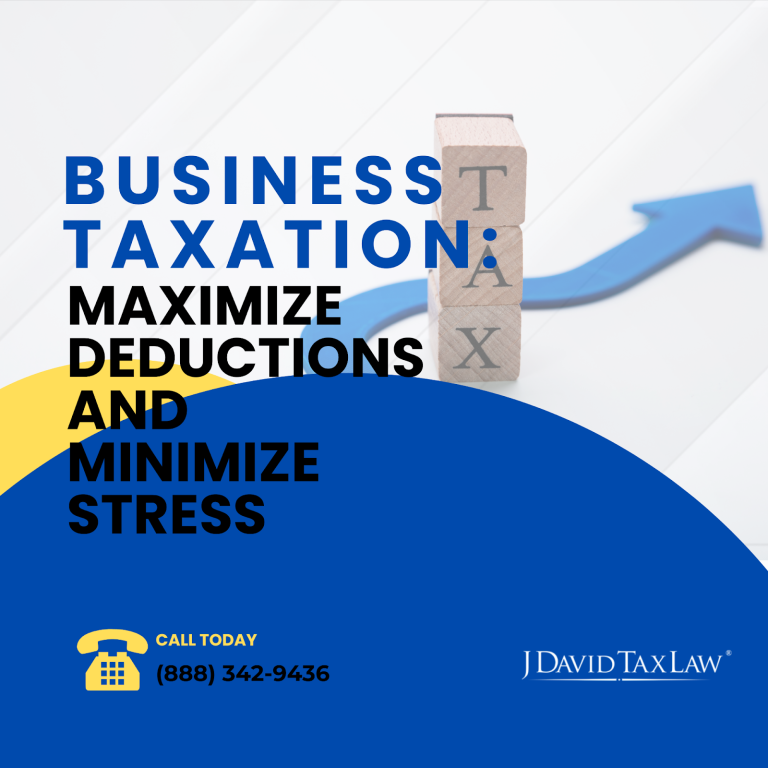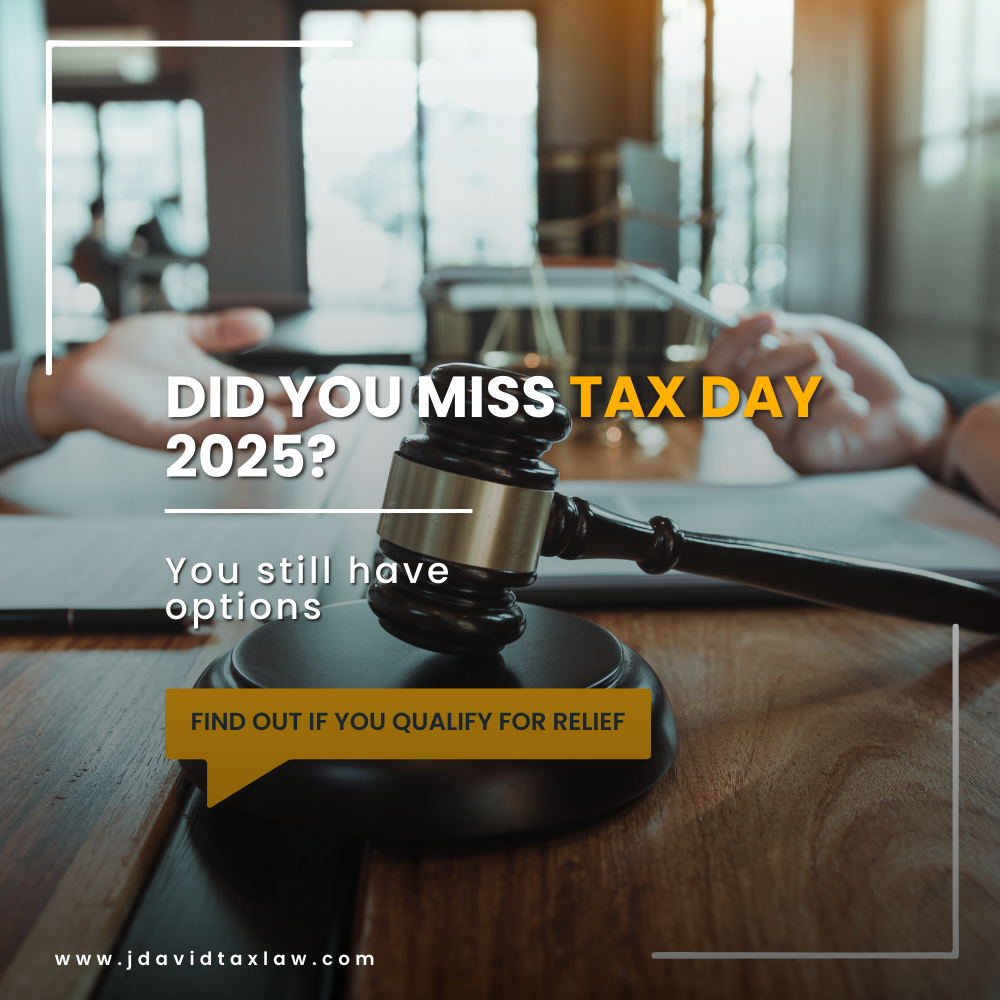
Yes, a tax attorney can negotiate with the IRS on your behalf,reducing penalties and resolving tax debt.Call our IRS tax relief attorney at (888) 342-9436.





For many, tax season brings a significant amount of stress due to the fear of potential financial liabilities. However, with the right strategies and knowledge, it is possible to transform this challenging time into an opportunity. You can start maximizing financial efficiency through effective deduction strategies.
Understanding how to effectively manage your business’s tax responsibilities is crucial. You need to know the various aspects of business taxation. This includes identifying and leveraging key tax deductions and settlement of your unpaid taxes. Hiring a tax lawyer from Baltimore, MD can help enhance your business’s financial health and reduce taxation worries.
Dealing with your taxes requires a sound understanding of both local and federal tax regulations. These factors can directly impact businesses and tax compliance. This dual layer of taxation influences how businesses plan their financial strategies throughout the fiscal year.
At the federal level, businesses must comply with IRS and Comptroller of Maryland regulations. It encompasses income taxes, payroll taxes, and various forms of excise taxes depending on the nature of the business. Federal income tax rates for businesses vary depending on the structure of the company. It is assessed based on its operations as a sole proprietorship, partnership, S corporation, or C corporation. As a business owner, you can learn your respective tax obligations in relation to your tax dues.
Businesses are subject to state income taxes in addition to federal taxes. The state income tax rate for corporations stands at a flat rate. It is also distinct from the bracketed rates applied to personal income. This flat rate simplifies state tax assessments for corporations but requires careful attention to ensure all state tax liabilities are met.
On the local level, businesses may be subject to additional taxes, such as personal property tax on business-owned equipment and furniture, and local income taxes. There are some States that do not impose a separate city income tax on businesses. However, personal income from business operations is subject to county-level income taxes, which are collected by the state.
Understanding these tax responsibilities is key to ensuring compliance and avoiding potential penalties. For business owners, having a tax attorney can help in applying a proactive approach to tax debt management. Staying informed about both local and federal tax updates is vital, as changes in legislation can directly impact business operations.
Leveraging tax deductions can reduce a business’s taxable income and enhance its profitability. Here’s a breakdown of common deductible expenses available to businesses.
Employee Salaries and Benefits: Wages, salaries, bonuses, and commissions paid to employees are fully deductible. Additionally, costs related to employee benefit programs, such as health insurance and retirement plans, are also deductible.
Office Expenses and Supplies: Everyday office supplies, software subscriptions, and equipment necessary for business operations are deductible.
Rent and Utilities: If you rent space for your business, the rent and associated utilities are deductible business expenses.
Marketing and Advertising: Costs incurred in promoting your business, including marketing materials, digital advertising, and public relations efforts, are deductible.
Travel and Meals: Business travel expenses, including transportation, lodging, and 50% of meal expenses, can be deducted.
Professional Fees: Legal, accounting, and consulting fees are all deductible expenses if they are directly related to operating your business.
Personal Property Tax Credit: Businesses can benefit from a personal property tax credit. This is aimed at specific industries or redevelopment zones, potentially lowering the tax burden on business assets.
Energy Credits: Businesses that invest in renewable energy solutions or energy-efficient upgrades may qualify for local credits. This is in addition to federal incentives.
By understanding the deductible expenses and employing strategic tax monitoring, businesses can significantly reduce their tax liabilities. Here are the common strategies to help business owners plan and increase their deductions during the tax season:
Maximizing tax deductions requires strategic planning and meticulous record-keeping. It is important to keep detailed records of all business transactions and retain receipts, invoices, and bank statements.
Use accounting software to categorize expenses and streamline record-keeping. Also, you can schedule monthly reviews of your financials to ensure all expenses are tracked and properly categorized.
When it comes to strategic purchasing and investments, you have to plan significant purchases or investments at the end of the fiscal year to offset taxable income for that year. This can be particularly effective if you anticipate higher profits.
Reinvest profits into areas that not only grow the business but also offer tax advantages. Some of these are equipment upgrades, research and development, and employee training programs.
J. David Tax Law stands out due to its specialized focus on tax debt resolution including its expertise in handling IRS disputes. Hiring this firm offers several distinct advantages:
Expertise in Tax Controversies: J. David Tax Law excels in managing tax controversies. It provides seasoned advocacy in disputes with the IRS or Comptroller of Maryland authorities.
Comprehensive Tax Services: From routine compliance to complex tax litigation, their range of services covers all aspects of tax law. This ensures comprehensive support for your business.
Proven Track Record: With a proven track record of successful outcomes for their clients, J. David Tax Law has demonstrated its ability to effectively manage even the most challenging tax situations.
Engaging with J. David Tax Law not only helps in managing current tax obligations. It also helps in strategically preventing tax issues in the future. Their professional guidance can be crucial in turning potential tax challenges into opportunities.
Effective tax management involves more than just compliance. It’s about strategically leveraging tax laws to benefit your business. Keeping yourself updated with all of the latest tax regulations with the help of a tax attorney can prevent any legal issues along the way.
Take action today—reach out to J. David Tax Law for a consultation to see how they can help your business’s financial future. The firm can also help you with IRS negotiations and maximizing tax-saving opportunities.
Our tax relief attorneys specialize in tax problems and tax debt resolutions
Get started with a 100% free consultation

Yes, a tax attorney can negotiate with the IRS on your behalf,reducing penalties and resolving tax debt.Call our IRS tax relief attorney at (888) 342-9436.

Missed the April 15 Tax Day 2025 deadline? Learn about IRS penalties, late payment relief, and how to settle your tax debt. Call us at (888) 342-9436.

IRS grants a tax deadline extension to California wildfire victims.Can you delay filing and payment until Oct. 15, 2025?Call at (888) 342-9436 to find out.
Get IRS Tax Assistance Within 24 Hours